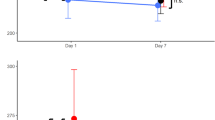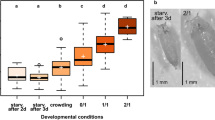Abstract
RATCLIFFE1 has recently suggested that there may possibly be two physiological races of L. sericata, as the length of the pupal period of this insect at 32°C. in Scotland is 5.4 days while in France at the same temperature it is 8 days. This latter figure is quoted from a paper by Davies2 who, in turn, is only quoting the work of Cousin3 in France. Unfortunately, the figure given by Davies is inaccurate and should be 4.9 days, not 8 days. I have found4 that humidity plays some part in determining the length of the pupal period, and as Cousin and Ratcliffe have not controlled this factor in their work, it is probable that the discrepancy observed is due to variable humidity. The postulation of physiological races on this type of data is to be deprecated.
This is a preview of subscription content, access via your institution
Access options
Subscribe to this journal
Receive 51 print issues and online access
$199.00 per year
only $3.90 per issue
Buy this article
- Purchase on Springer Link
- Instant access to full article PDF
Prices may be subject to local taxes which are calculated during checkout
Similar content being viewed by others
References
Ann. Appl. Biol., 22, 742 (1935).
Ann. Appl. Biol., 21, 267 (1934).
Bull Biol. France Belg. Suppl. 15 (1932).
Parasitology, 27, 291 (1935).
Author information
Authors and Affiliations
Rights and permissions
About this article
Cite this article
EVANS, A. Physiological Races of Lucilia sericata, Mg. Nature 137, 33–34 (1936). https://doi.org/10.1038/137033c0
Issue Date:
DOI: https://doi.org/10.1038/137033c0
Comments
By submitting a comment you agree to abide by our Terms and Community Guidelines. If you find something abusive or that does not comply with our terms or guidelines please flag it as inappropriate.



